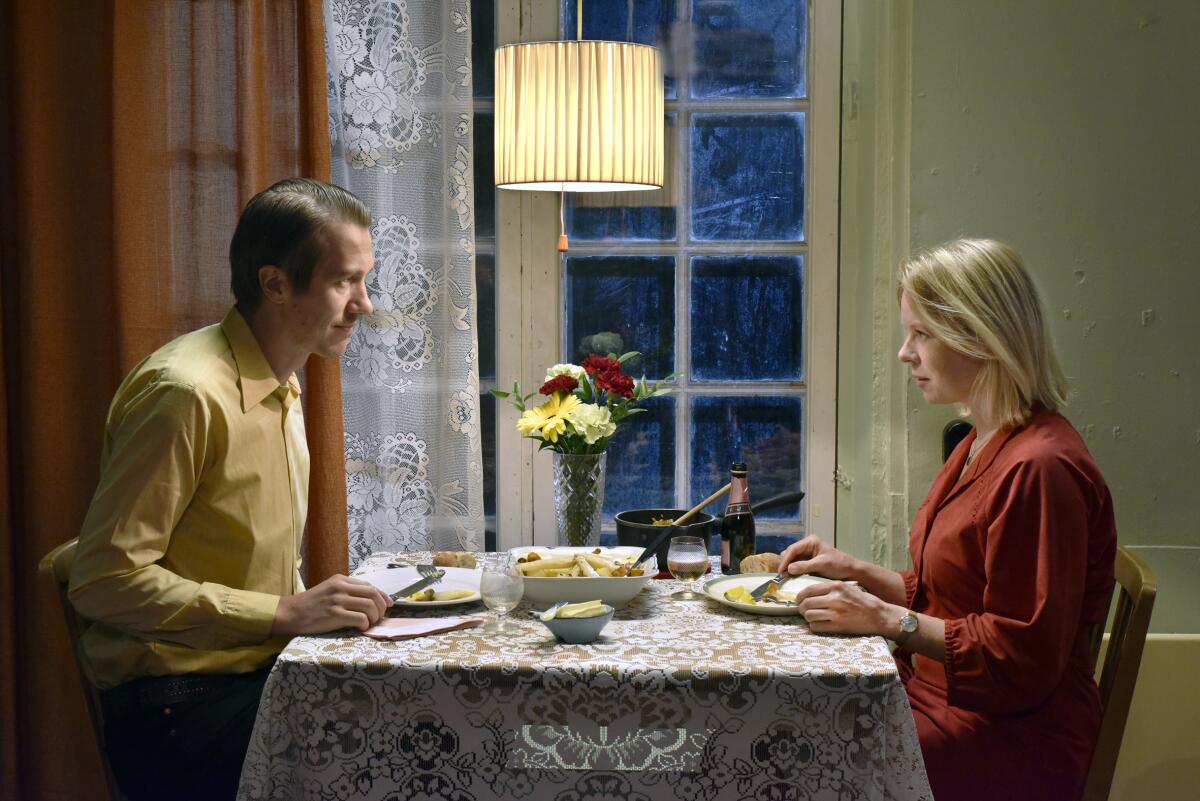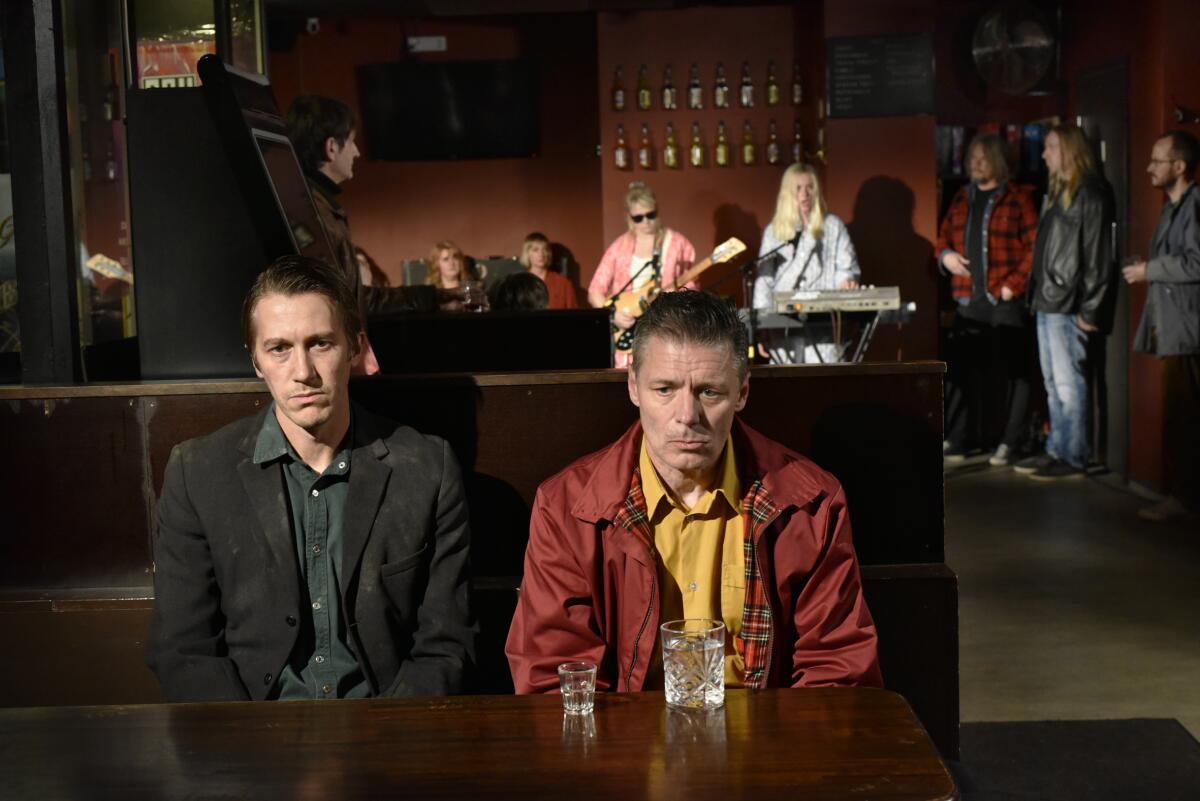In ‘Fallen Leaves,’ a Finnish master returns with another deadpan dream of romance

- Share via
Two middle-aged women, Ansa (Alma Pöysti) and Liisa (Nuppu Koivu), have just been abruptly fired from their supermarket jobs. Walking out with their heads held high, the friends clasp hands for a brief instant while looking warmly at each other. That wordless gesture of solidarity is among the many muted wonders of “Fallen Leaves,” an affirmation of the hope we can find in the company of others, laced with a flesh-and-blood romanticism.
Harnessing Nordic melancholia to laugh at the misery of capitalist malaise, Finnish master Aki Kaurismäki makes movies about people who don’t say much but feel plenty. For decades, he’s tapped into the souls of working-class outcasts, the lonely hearts unwilling to let their unfavorable position in a somber world rob them of an innate right to joy.
The manual labor that many of his characters do is of little importance. They lose jobs and quickly find others to make a living. Work doesn’t define them. It’s their quiet inner vastness that concerns Kaurismäki, which he crystallizes into an unassuming humanism, unmistakably his.
Often his protagonists operate with an enviable matter-of-factness about their feelings. They act on impulse with immediate conviction, unafraid to commit to another person they have just met. That’s perhaps because Kaurismäki conceives these sturdy people to be wiser than most about how rare it is to come across someone with matching wounds.
Such is the case in “Fallen Leaves,” which plays like a spiritual continuation to the director’s so-called Proletariat Trilogy from the late ‘80s and early ‘90s. His newest set of downbeat lovers, Ansa and Holappa (Jussi Vatanen), a welder with a serious alcohol problem, first meet in a crowded bar where karaoke enthusiasts belt out melodramatic pop ballads. Their affinity for each other intensifies in the darkness of a movie theater to the strains of a zombie movie (Jim Jarmusch’s similarly deadpan “The Dead Don’t Die”).
There’s a timelessness that Kaurismäki bestows on his tight but unhurried narratives that adds to the fable-like atmosphere. The modesty of his frames — subdued primary colors, static compositions, purposefully dimmed lighting — brings a slightly heightened mood to his peculiar take on social realism. If it weren’t for brief sightings of modern technology, one could easily assume “Fallen Leaves” came from a bygone era.

Despite cinema’s compassionate illusions, time does move us forward, demanding its pound of flesh. “I won’t live to be that old,” Holappa tells a teasing best bud, Huotari (Janne Hyytiäinen, part of Kaurismäki’s troupe since 2002’s “The Man Without a Past”). Conscious of the vices that plague him, Holappa’s quip resonates since several actors who starred in Kaurismäki’s early films have met with untimely deaths.
Kaurismäki constantly flirts with despair, only to find pockets of absurdist humor in everyday cruelty. In 1988’s “Ariel,” about an average man who becomes a criminal, a gag about a convertible lands with hysterical timing just moments from a shootout. “Fallen Leaves” contains its share of finely tuned comedy: a security guard’s accusing stare, an off-camera arrest revealed in a sharp edit.
All of this underlying dramatic texture is possible because Kaurismäki uses actors capable of developing salt-of-the-earth types beyond mere simple-minded objects of pity. Pöysti’s inquisitive gaze and faint smile tell us more about Ansa’s strong-willed persona than any speechified backstory could. In Vatanen’s charmingly self-important Holappa, we see a man wholeheartedly disarmed by her qualities. It’s in the unencumbered sincerity of their exchanges, even in silence, that the movie proves they’re better together.
Even Chaplin, Ansa’s pointy-eared pup (continuing the veteran filmmaker’s fondness for enlightening day-to-day existence with pets), gets a moving close-up.
Ansa and Holappa, whose loving essence defies their circumstances, join the many beaten but undefeated people Kaurismäki has envisioned over a prolific career. (They’re his “fallen leaves” from the tree of a lengthy filmography.) The auteur’s humbleness, as well as his proclivity to deploy vibrant music to verbalize what his reserved characters can’t articulate, remain the signatures of his masterful body of work. This time, there’s some bar-band synth pop.
Fiercely political, Kaurismäki famously refused to attend the Academy Awards when “The Man Without a Past” earned Finland its first ever nomination, his absence a protest against the war in Iraq. Global tragedies are never far from mind in his films. Every time Ansa turns on the radio, news of today’s onslaught in Ukraine enters her home. In 1990’s “The Match Factory Girl,” reports on the Tiananmen Square massacre appear daily on TV. More recently, in 2017’s “The Other Side of Hope,” he tackled the refugee crisis.
These invasions of real-world pain serve as a counterpoint to Kaurismäki’s overall strategy, which is to extract gentleness from hardship and, ultimately, demonstrate how much we need one another. The year’s most succinctly perfect film, “Fallen Leaves” aims to do for us what companionship does for its couple: make this treacherous life a bit more bearable.
'Fallen Leaves'
(In Finnish, with English subtitles)
Not rated
Running time: 1 hour, 21 minutes
Playing: Laemmle Royal, West Los Angeles
More to Read
Only good movies
Get the Indie Focus newsletter, Mark Olsen's weekly guide to the world of cinema.
You may occasionally receive promotional content from the Los Angeles Times.










